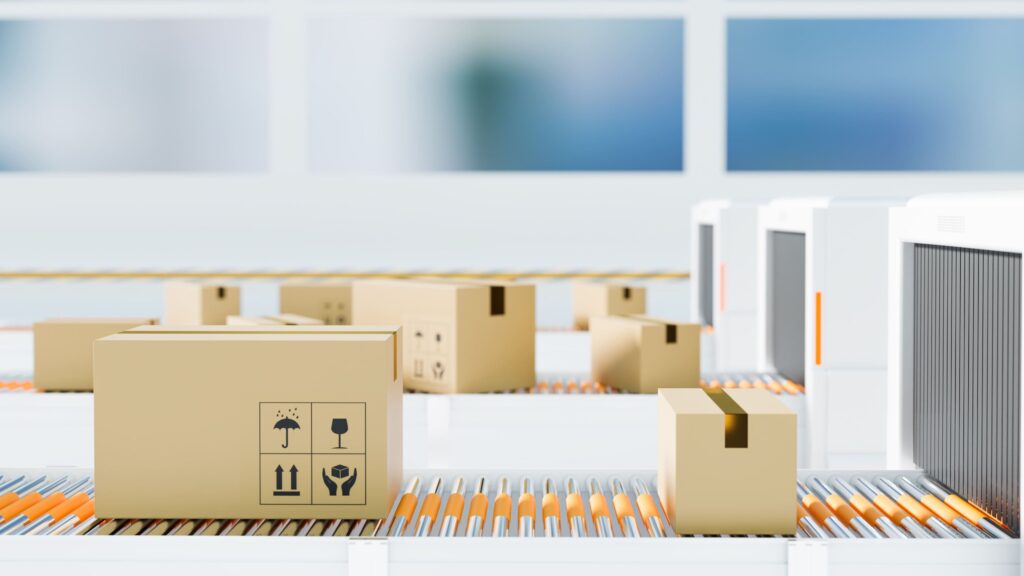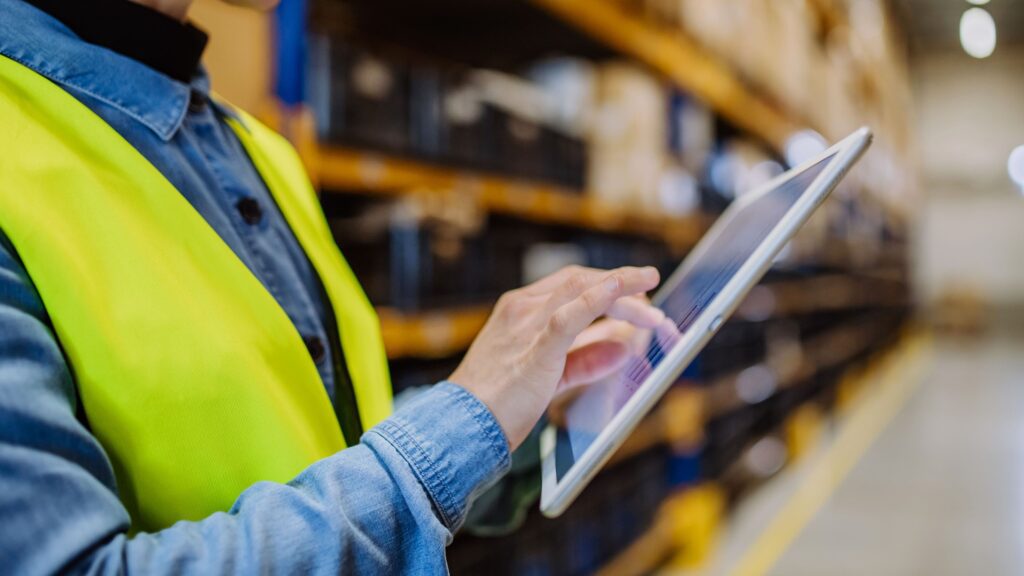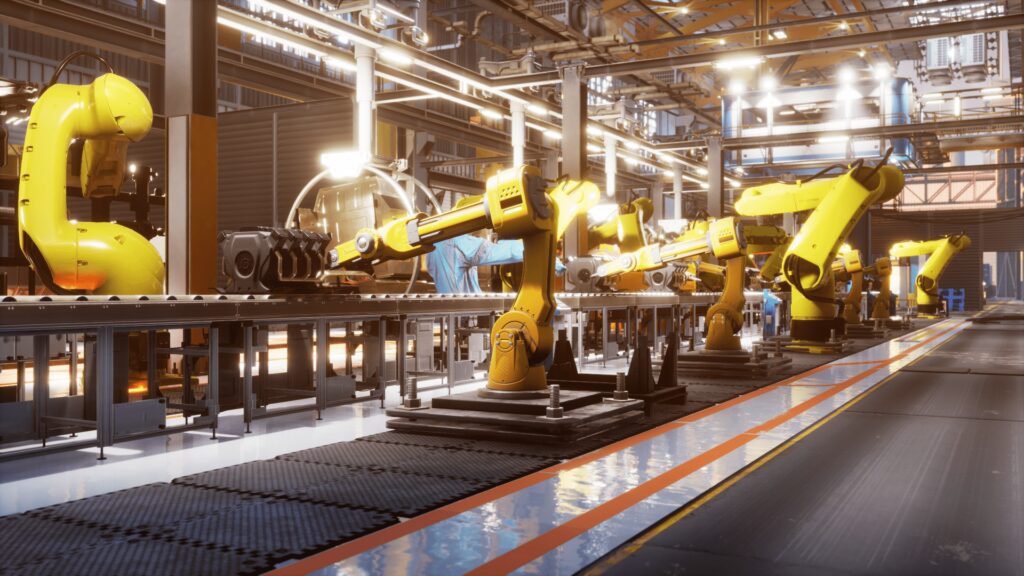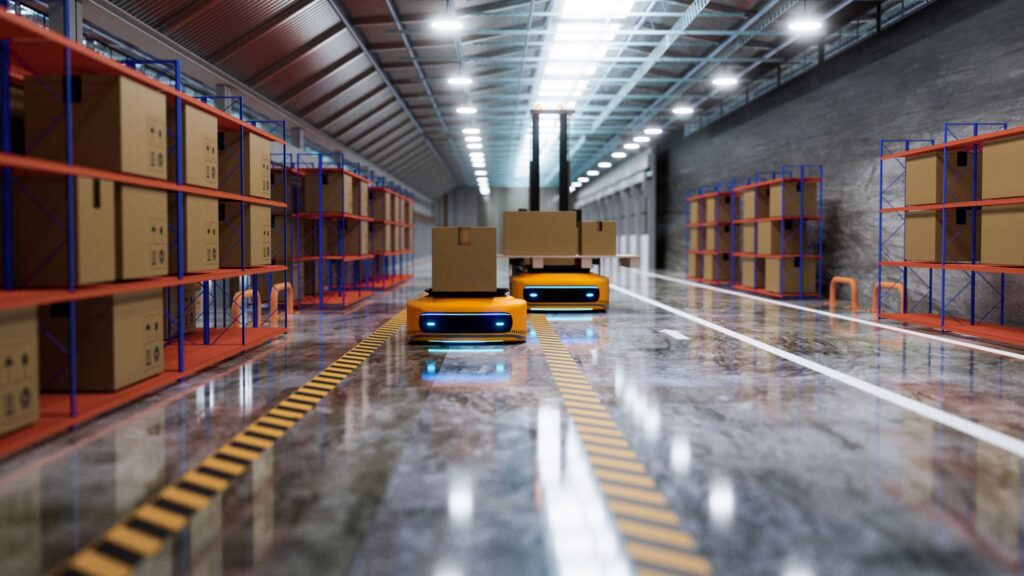A number of trends are plotting a course for the logistics sector towards a more efficient, sustainable and connected future. Find out in this Macsa id article about the five most important logistics trends that will be shaping the industry this year.

TABLE OF CONTENTS
- Introduction
- Digitalisation of logistics processe
- Warehouse automation and robotisation
- Consolidation of the industrial metaverse in the supply chain
- Artificial intelligence
- Warehouse sustainability
- Conclusions
1. Introduction
Logistics is the engine that allows us to brings products from all over the world to our door. It allows raw materials and finished products to reach their destination safely and efficiently. With the rise of technology, this sector is not only essential, but also constantly evolving.
Here are five trends that will dominate this business area in 2024.
2. Digitalisation of logistics processes
One of the clearest logistics trends for 2024 is digitalisation. Not only in the activities that take place inside, but also outside a warehouse.
Warehouse management software is one clear example. Tracking of goods is indispensable. Analysing performance, making predictive decisions and ensuring efficient control of all processes generated in the warehouse so as to increase productivity.
Furthermore, in the context of digitalisation, the implementation of emerging technologies such as the Internet of Things (IoT) and blockchain will play a crucial role. The real-time connection of devices and systems will enable not only the tracking of goods, but also full visibility of the supply chain. In addition, the blockchain will ensure the integrity and security of information, contributing to transparency and trust in logistics operations.

Product traceability will be absolute, so the option of accessing real-time information is already a must. Shorter delivery times, and hence greater end-customer satisfaction, will be key factors in maintaining a competitive edge in this sector. Product marking is essential here to identify each item.
In addition, digitalisation will also facilitate collaboration between different actors in the supply chain, enabling more efficient communication and collaborative decision-making. The implementation of advanced data management solutions will improve analytics, providing valuable information for the continuous optimisation of logistics processes.
3. Warehouse automation and robotisation
Logistics is also undergoing its own 4.0 transformation. Logistics centres are increasingly using certain technologies to automate and optimise functions so as to create more efficient and effective working environments.
The revolution in warehouse automation and robotisation will extend to the use of autonomous vehicles, drones and automated storage systems. The incorporation of machine learning algorithms will allow robots to adapt and improve their capabilities over time. Human-machine collaboration will become closer, with collaborative robots working alongside employees for complex and demanding tasks, improving efficiency and reducing the risk of occupational injuries.
Robotic automation is revolutionising certain processes, such as picking. A development that not only increases productivity, but also reduces labour and operating costs.

Furthermore, the integration of augmented reality into logistics processes will provide real-time visual guidance, streamlining picking and packing operations. Artificial intelligence-based warehouse management systems will not only optimise product flow, but also anticipate market demands and dynamically adjust logistics strategies.
If you want to learn more about how you can increase productivity and safety through automation and collaborative robotics, we invite you to the webinar to be held on 7 February. Sign up here.
4. Consolidation of the industrial metaverse in the supply chain
The industrial metaverse is a virtual space designed to make it easier for companies to properly manage industrial activities and processes. Large companies are already implementing it with a highly positive impact, exceeding all expectations.
The industrial metaverse opens the door to the possibility of remote collaboration, supply chain simulation and training in a virtual world. And it will not only focus on remote collaboration and simulation, but will also open up new possibilities in employee education and training. Virtual reality will provide realistic training environments for supply chain workers, allowing them to practice and hone their skills in a virtual environment before applying them in reality. This will not only improve operational efficiency, but also reduce errors and increase workplace safety.

In addition, the consolidation of the industry metaverse will foster the creation of virtual communities where logistics professionals can exchange knowledge, best practices and experiences, promoting continuous innovation in the industry.
A field that can only be implemented with a great many different technical enablers. These include another trend we expand on below: artificial intelligence.
5. Artificial intelligence
The implementation of artificial intelligence is a slow process but undoubtedly a necessary reality. Increased speed, accurate order processing and optimisation of available resources are just some of the benefits.
The application of AI will expand to the personalisation of customer services through advanced predictive analytics. Customer service chatbots will not only answer questions, but anticipate customer needs and offer proactive solutions. AI will also be integrated into demand forecasting systems, improving forecast accuracy and reducing inventory levels.

The implementation of artificial intelligence in the supply chain will not only be limited to route optimisation, but will also improve inventory management, capacity planning and strategic decision making at the enterprise level.
6. Warehouse sustainability
Sustainability in the field of industrial logistics is already a non-negotiable necessity. This will be the year when large companies make changes to adopt new processes and the resources needed to become more sustainable.
Warehouse sustainability will go beyond energy efficiency and waste reduction. The adoption of sustainable packaging and the implementation of reverse logistics practices will become key elements in reducing the carbon footprint. Real-time monitoring of carbon emissions and the use of renewable energy will contribute to mitigating the environmental impact of logistics operations.

In addition, collaboration with suppliers and logistics partners to establish common sustainability standards will be a growing trend. Transparency in sustainable practices will not only be a market requirement, but also a differentiating factor in business competitiveness.
6. Conclusions
Constant technological innovation and adaptation to emerging trends are crucial to ensure competitiveness in the logistics sector. Keeping abreast of these trends not only provides a strategic advantage, but also contributes to sustainable development and to building a more efficient and responsible logistics future.
At Macsa id we understand that transformation is essential for the competitiveness of today’s businesses. It is vital to keep abreast of trends so as to be prepared and make the most of the opportunities that will arise this year.
Our mission is to guarantee industrial product safety, thereby achieving peace of mind for customers while ensuring a better tomorrow for our future generations. All thanks to constant investment in technological innovation that specifically addresses the coding, identification and traceability needs of our customers.
Are you keen to ensure the safety of your products?

